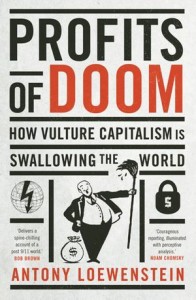A study examining the causes of a dramatic spike in birth defects in the Iraqi city of Falluja has for the first time concluded that genetic damage could have been caused by weaponry used in US assaults that took place six years ago.
The research, which will be published next week, confirms earlier estimates revealed by the Guardian of a major, unexplained rise in cancers and chronic neural-tube, cardiac and skeletal defects in newborns. The authors found that malformations are close to 11 times higher than normal rates, and rose to unprecedented levels in the first half of this year – a period that had not been surveyed in earlier reports.
The findings, which will be published in the International Journal of Environmental Research and Public Health, come prior to a much-anticipated World Health Organisation study of Falluja’s genetic health. They follow two alarming earlier studies, one of which found a distortion in the sex ratio of newborns since the invasion of Iraq in 2003 – a 15% drop in births of boys.
“We suspect that the population is chronically exposed to an environmental agent,” said one of the report’s authors, environmental toxicologist Mozhgan Savabieasfahani. “We don’t know what that environmental factor is, but we are doing more tests to find out.”
The report identifies metals as potential contaminating agents afflicting the city – especially among pregnant mothers. “Metals are involved in regulating genome stability,” it says. “As environmental effectors, metals are potentially good candidates to cause birth defects.
The findings are likely to prompt further speculation that the defects were caused by depleted uranium rounds, which were heavily used in two large battles in the city in April and November 2004. The rounds, which contain ionising radiation, are a core component of the armouries of numerous militaries and militias.
Their effects have long been called into question, with some scientists claiming they leave behind a toxic residue, caused when the round – either from an assault rifle or artillery piece – bursts through its target. However, no evidence has yet been established that proves this, and some researchers instead claim that depleted uranium has been demonstrably proven not to be a contaminant.
The report acknowledges that other battlefield residues may also be responsible for the defects. “Many known war contaminants have the potential to interfere with normal embryonic and foetal development,” the report says. “The devastating effect of dioxins on the reproductive health of the Vietnamese people is well-known.”
The latest Falluja study surveyed 55 families with seriously deformed newborns between May and August. It was conducted by Dr Samira Abdul Ghani, a paediatrician at Falluja general hospital. In May, 15% of the 547 babies born had serious birth defects. In the same period, 11% of babies were born at less than 30 weeks and 14% of foetuses spontaneously aborted.
The researchers believe that the figures understate what they describe as an epidemic of abnormalities, because a large number of babies in Falluja are born at home with parents reluctant to seek help from authorities.
One case documented in the report is of a mother and her daughter who after the 2004 battles both gave birth to babies with severe malformations. The second wife of one of the fathers also had a severely deformed baby in 2009.
“It is important to understand that under normal conditions, the chances of such occurrences is virtually zero,” said Savabieasfahani.

 Vulture capitalism has seen the corporation become more powerful than the state, and yet its work is often done by stealth, supported by political and media elites. The result is privatised wars and outsourced detention centres, mining companies pillaging precious land in developing countries and struggling nations invaded by NGOs and the corporate dollar.
Best-selling journalist Antony Loewenstein travels to Afghanistan, Pakistan, Haiti, Papua New Guinea and across Australia to witness the reality of this largely hidden world of privatised detention centres, outsourced aid, destructive resource wars and militarized private security. Who is involved and why? Can it be stopped? What are the alternatives in a globalised world?
Vulture capitalism has seen the corporation become more powerful than the state, and yet its work is often done by stealth, supported by political and media elites. The result is privatised wars and outsourced detention centres, mining companies pillaging precious land in developing countries and struggling nations invaded by NGOs and the corporate dollar.
Best-selling journalist Antony Loewenstein travels to Afghanistan, Pakistan, Haiti, Papua New Guinea and across Australia to witness the reality of this largely hidden world of privatised detention centres, outsourced aid, destructive resource wars and militarized private security. Who is involved and why? Can it be stopped? What are the alternatives in a globalised world? 

 The 2008 financial crisis opened the door for a bold, progressive social movement. But despite widespread revulsion at economic inequity and political opportunism, after the crash very little has changed.
Has the Left failed? What agenda should progressives pursue? And what alternatives do they dare to imagine?
The 2008 financial crisis opened the door for a bold, progressive social movement. But despite widespread revulsion at economic inequity and political opportunism, after the crash very little has changed.
Has the Left failed? What agenda should progressives pursue? And what alternatives do they dare to imagine?
 The Blogging Revolution, released by
The Blogging Revolution, released by  The best-selling book on the Israel/Palestine conflict,
The best-selling book on the Israel/Palestine conflict,